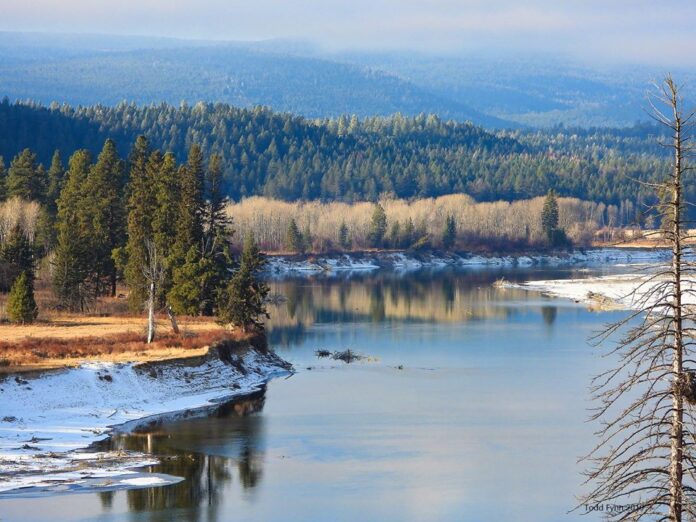Leadership of the transboundary Ktunaxa Nation is encouraged by the Canadian and US governments agreeing to ask the International Joint Commission (IJC) to study mining pollution in the Elk and Kootenay rivers.
The Ktunaxa Nation, which is made up of the Confederated Salish and Kootenai Tribes, Kootenai Tribe of Idaho, and the Ktunaxa First Nations of ʔakisq̓nuk, ʔaq̓am, Yaqan Nuʔkiy, and Yaq̓it ʔa·knuqⱡi’it, have been pushing for the IJCs involvement for over a decade.
“This is an important first step in addressing the serious pollution problem in the Kootenai Watershed, and I am glad to see that the U.S. and Canada are finally taking their commitments to Indigenous peoples, the environment, and the international Boundary Waters Treaty seriously,” said Gary Aitken Jr., Vice Chairman of the Kootenai Tribe of Idaho. “For decades, mining has impacted our waters, our people, and our resources. While we were seeking action, things moved far too slowly, and the federal government looked the other way. We are finally starting a process where there can be collaboration, trust, and transparency. Ktunaxa said we would not stop until there was an action plan, and we look forward to seeing that through to ensure the real work of healing the river is achieved.”
Ktunaxa Nation Council (KNC) officials said the reference asks the IJC to convene a governance body that will develop an action plan to address the impacts of mining pollution in the Elk-Kootenay watershed.
“This body will be comprised of impacted governments with jurisdiction and legal obligations in the watershed,” said KNC officials. “The reference also establishes an IJC Study Board that will bring experts and knowledge holders together to share knowledge and data in a coordinated, transparent process.”
The KNC feels this process will create a common understanding of pollutants in the watershed and the impacts they are having on humans, animals and the ecosystem.
In March of 2023, Prime Minister Justin Trudeau and President Joe Biden committed reach an agreement to start addressing Elk/Kootenay River pollution by the summer, but KNC officials said that deadline passed with no actions from the federal governments.
The inaction led to more pressure from the Ktunaxa Nation.
“This prompted Ktunaxa leaders to call upon both federal governments to meet in ʔamakʔis Ktunaxa (Ktunaxa Territory) in November 2023 to work through the impasse and agree on a path forward. At that meeting, the governments collectively committed to find a solution—through a reference to the IJC—by the end of the year,” said KNC officials. “After nearly three months of intense negotiations, the governments reached agreement, and almost exactly a year after the Prime Minister and President’s statement, the reference has finally been issued to the IJC.”
“For too long, the U.S. and Canada have stood by while our waters suffered,” said Michael Dolson, Chairman of the Confederated Salish and Kootenai Tribes. “We are encouraged by the federal governments’ change in direction and the progress that was achieved when we all worked together these past months. We will continue to work tirelessly to restore our rivers and the fish and wildlife that depend upon them. We’re at the beginning of what will likely be a long process, one that will require sustained effort from all governments involved.”
Ktunaxa Nation Council Chair Kathryn Teneese said she’s pleased to see progress on the issue.
“It is good to see that the U.S. and Canada—in partnership with the Ktunaxa Nation— have started collaborating effectively on this issue and are working toward meeting their commitment to reduce and mitigate the mining pollution in the Kootenai/y watershed,” said Teneese. “However, just as this agreement could not have been reached without the deep involvement of the Ktunaxa Nation, future progress will require meaningful inclusion of Ktunaxa knowledge and stewardship. We are setting the foundation for an IJC, and we welcome the IJC Commissioners’ involvement in this issue. We hope this is the beginning of a collaborative, transparent, and effective process that will restore the waterways in the heart of ʔamakʔis Ktunaxa that are vital to the Ktunaxa ʔakⱡsmaknik (people).”
Previous: Canadian and US governments commit to IJC referral on Elk-Kootenay watershed pollution (Mar. 11, 2024)


